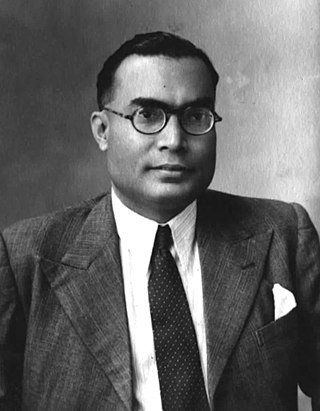The Internet Protocol (IP) is the network layer communications protocol in the Internet protocol suite for relaying datagrams across network boundaries. Its routing function enables internetworking, and essentially establishes the Internet.

The Indian Institute of Science (IISc) is a public, deemed, research university for higher education and research in science, engineering, design, and management. It is located in the southern Indian city of Bangalore, Karnataka. The institute was established in 1909 with active support from Jamsetji Tata and thus is also locally known as the Tata Institute. It is ranked among the most prestigious academic institutions in India and has the highest citation-per-faculty among all the universities in the world. It was granted a deemed university status in 1958 and recognized as an Institute of Eminence in 2018. In 2021, IISc launched the Respin speech-to-text project with funding from the Bill & Melinda Gates Foundation.

A wide area network (WAN) is a telecommunications network that extends over a large geographic area. Wide area networks are often established with leased telecommunication circuits.

Satellite Internet access is Internet access provided through communication satellites; if it can sustain high speeds, it is termed satellite broadband. Modern consumer grade satellite Internet service is typically provided to individual users through geostationary satellites that can offer relatively high data speeds, with newer satellites using the Ku band to achieve downstream data speeds up to 506 Mbit/s. In addition, new satellite internet constellations are being developed in low-earth orbit to enable low-latency internet access from space.

The Centre for Development of Advanced Computing (C-DAC) is an Indian autonomous scientific society, operating under the Ministry of Electronics and Information Technology.
6LoWPAN was a working group of the Internet Engineering Task Force (IETF). It was created with the intention of applying the Internet Protocol (IP) even to the smallest devices, enabling low-power devices with limited processing capabilities to participate in the Internet of Things.

Anurag Kumar was the Director of the Indian Institute of Science at Bangalore, India from 2014–2020. He is a professor at the Department of Electrical Communication Engineering, and has served as the Chairperson of the Electrical Sciences Division at the Indian Institute of Science, before being appointed as the Director in 2014.

Internet in India began in 1986 and was initially available only to the educational and research community. General public access to the internet in India began on 15 August 1995. By 2023, India had more than 900 million Internet users. It is reported that in 2022 an average mobile Internet consumption in India was 19.5 GB per month and the mobile data usage per month rose from 4.5 exabytes in 2018 to 14.4 exabytes in 2022.
Rudra Pratap is an Indian academician and the vice-chancellor of Plaksha University, Mohali. Previously, he was a professor of Mechanical Engineering at the Indian Institute of Science (IISc), Bangalore. Among other research interests, he works in the field of Microelectromechanical systems (MEMS) and used to head India's first research lab in the field of Microelectromechanical systems, the CranesSci MEMS Lab at Indian Institute of Science, Bangalore. His book on MATLAB Getting Started with MATLAB 7 is popular among the students of engineering. He is also the Chair for the Centre of Nanoscience and Engineering (CeNSE).
WorldLink Communications is an Internet service provider in Nepal. The nation's largest ISP, it has 900,000 active consumer accounts and 2,000 business accounts, along with approximately 25,000 subscribers to its NET TV IPTV service, and covers 73 of the nation's 77 districts. As of 2023, it has around 700,000 fiber to the home customers and 31% market share in Nepal.
Brahm Prakash, was a metallurgist known for his work with nuclear materials in India.

ACOnet is the name of the national research and education network in Austria. The ACONET association promotes the development and use of that network. ACOnet is not managed and operated by ACONET, but by a unit in the Computing Centre of the University of Vienna that also operates the Vienna Internet Exchange. The University of Vienna represents ACOnet internationally, for example as a member of TERENA and as a participant in the project that funds the European backbone network GÉANT.
Sanghamitra Bandyopadhyay is an Indian scientist specializing in computational biology. A professor at the Indian Statistical Institute, Kolkata, she is a Shanti Swarup Bhatnagar Prize winner in Engineering Science for 2010, IInfosys Prize 2017 laureate in the Engineering and Computer Science category and TWAS Prize winner for Engineering Sciences in 2018. Her research is mainly in the areas of evolutionary computation, pattern recognition, machine learning and bioinformatics. Since 1 August 2015, she has been the Director of the Indian Statistical Institute, and she would oversee the functioning of all five centres of Indian Statistical Institute located at Kolkata, Bangalore, Delhi, Chennai, and Tezpur besides several other Statistical Quality Control & Operation Research Units spread across India. She is the first woman Director of the Indian Statistical Institute. Currently she is on the Prime Ministers' Science, Technology and Innovation Advisory Council. In 2022 she was given the Padma Shri award for Science and Engineering by the Government of India.
Sandhya Srikant Visweswariah is a scientist and academic at the Indian Institute of Science, Bangalore, India. She is currently the Chairperson of the Department of Molecular Reproduction, Development and Genetics and the Co-chair of the Centre for Biosystems Science and Engineering, Indian Institute of Science. She additionally holds the position of Adjunct Professor, Faculty of Medicine and Dentistry, University of Bergen, Norway. Her research involves the investigation of the mechanism of signal transduction via cyclic nucleotides, phosphodiesterases and novel cyclases in bacteria. Most recently, she was awarded a Bill and Melinda Gates Grand Challenges Explorations Grant for her proposal entitled "A Small Animal Model of ETEC-Mediated Diarrhea".
Nagasuma Chandra is an Indian structural biologist, biochemist and a professor at the department of biochemistry of the Indian Institute of Science. She is known for her studies on Mycobacterium tuberculosis. The Department of Biotechnology of the Government of India awarded her the National Bioscience Award for Career Development, one of the highest Indian science awards, for her contributions to biosciences in 2008.
Ganesh Nagaraju is an Indian biochemist, geneticist, cancer biologist and a full professor at the Department of Biochemistry of the Indian Institute of Science. He has been studying DNA damage responses in mammalian cells, and mechanisms underlying chromosome instability genetic diseases and cancer. The Department of Biotechnology of the Government of India awarded him the National Bioscience Award for Career Development, for his contributions to biosciences, in 2015. In 2018, Nagaraju received the Shanti Swarup Bhatnagar Prize for Science and Technology in Biological Sciences from CSIR. This award is given in recognition of outstanding contributions to Science and Technology, and is considered one of the highest awards for science in India.
Amit Singh is an Indian microbiologist and an associate professor at the department of microbiology and cell biology of the Indian Institute of Science. A Wellcome-DBT Senior Fellow, Singh is known for his studies on the pathogenesis of Mycobacterium tuberculosis. The Department of Biotechnology of the Government of India awarded him the National Bioscience Award for Career Development for 2017/18. He was awarded with the prestigious CSIR- Shanti Swarup Bhatnagar award on 2021 for his phenomenal contributions in bio-scientific research. He received the 2021 Shanti Swarup Bhatnagar Prize for Science and Technology in Biological Science.

Prof. Siddheshwari Prasad Chakravarti was an Indian engineer, researcher, and educator. He was known as the father of electronics and telecommunications engineering in India.








